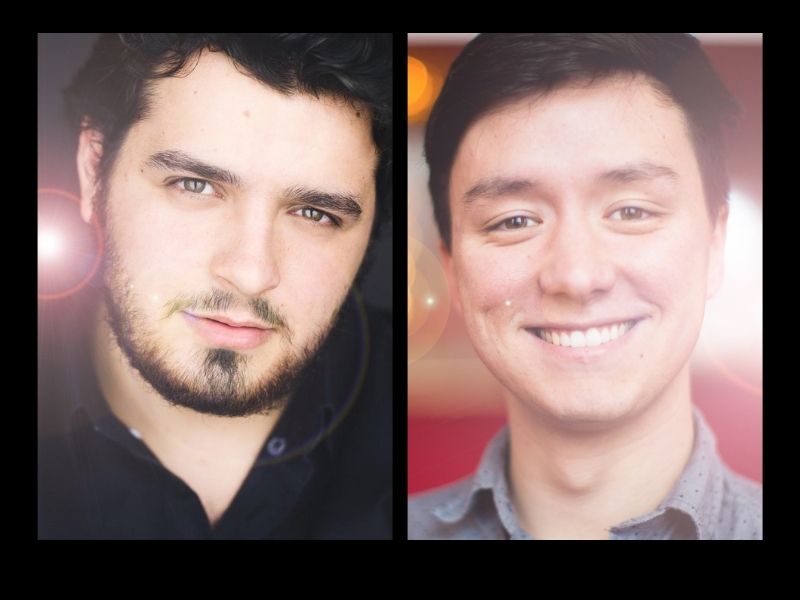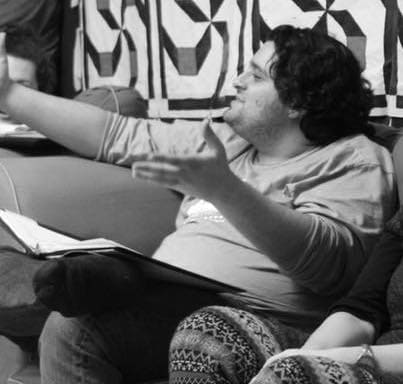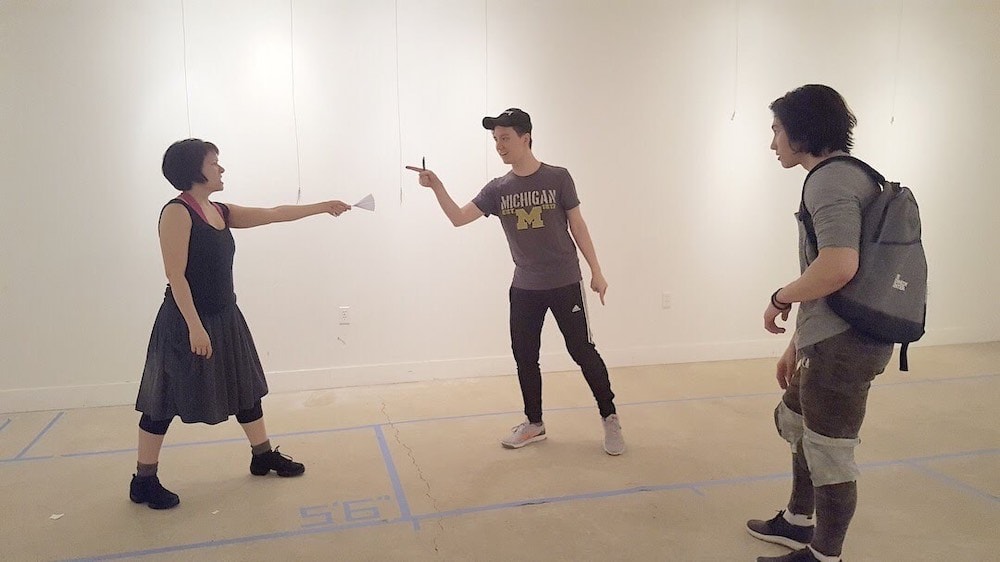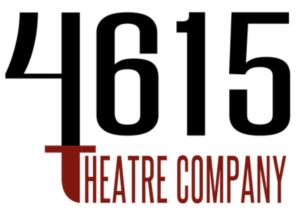Gregory Keng Strasser (producing director): Hey, Jordan.
Jordan Friend (artistic director): Hey, Greg. I guess we have to pretend like we don’t talk to each other every day.
Greg: So. 4615 GO — where did these ideas start to form?
Jordan: I’d say they started from you! Specifically, a lot clicked into place when you pitched a video game for 4615. To rewind, I found myself at a pretty major creative road block a few months into the pandemic, at least as far as theater goes. We’d had some really great success with online readings, particularly via our Q-Fest collaborations with Adventure Theatre MTC, Convergence Theatre, and ArtsCentric. After August, though, I started getting antsy. I was feeling bogged down by these constant debates over what would or wouldn’t count as theater in the virtual world, which were elevated by the union deliberations between SAG and AEA.
One of the things so many people love about theater is that it can be limitless. Then, suddenly, we’re all having to go “Is this allowed?” or “Does this count?” When you wrote to me and said “What if we did a video game?,” it just woke that rebel spirit up that’s so integral to 4615. We’ve always felt like troublemakers, and we tend to choose shows that make people go, “Are you sure that’s going to work with your space and resources?” Your idea brought that feeling back, and was a natural continuation of where we were at when the pandemic hit, with our immersive production of Renee Calarco’s Museum 2040, which also drew outside the lines.
Once we decided to throw the whole “Is this theater?” debate out the window, that paved the way for what we have now, which includes a poetic phone call, an interactive video concert, a tabletop gaming series, and your video game, all of which share a spirit of theater while being their own thing. These are all dream projects for the people making them, and they’re in forms where we can fully realize them without concessions. Rather than trying to imitate theater, we get to say it’s been here the whole time, right under our noses.
OK, rant over. For me this has been rushing into place quite quickly, but I know it started earlier for you!

Greg: The seeds of 4615 GO were planted over the summer for me. It began with the BIPOC Emerging Theatre Leaders Forum that Paige Washington [4615’s director of patron services] and I led. We had over 40 emergent theater leaders from across the nation RSVP to attend, and our gathering included around 25 incredible artists in robust discussion dedicated to activating our mutual braintrust, forming coalitions, and coming up with ways to innovate the field during and post pandemic.
I was inspired by all of the incredible steps people across the nation had taken with their companies to engage communities and keep their artistry alive. When I saw what was possible, I thought to myself, “We can do things like that too!”
One of the major points of discussion was “What is theater?”
At consensus, we agreed on three points: theater is live. Theater occurs in a shared space. Theater is also an experience, an event. Resident Artist Dylan Arredondo said that theater was the original virtual reality — because it combined analog (props, scenery, people in spaces) with the virtual (suspension of disbelief, music, aesthetic, ambience, imagination, etc.), and that’s ultimately what drove me to the pitch.
So we had to start with what was in our assets, and ask ourselves: what was achievable? Well, I knew that I could code remedially. I had made some video games in the past, and video games — I have always believed — possess the spirit of theatricality in them. Then I realized, Oh, that’s an asset 4615 has.
Then I thought about all of the amazing resident artists in our cohort. I am new to the tabletop world, but when I played Dungeons and Dragons for the first time with Jon Jon [Johnson, resident artisst], I was like, “I am literally playing a character, speaking in their voice, going on these quests … ohmigod this is a damn play!” So that was in our assets.
You had a song cycle you’d been working on; that was one of our assets too. Finally, Britt Willis, who isn’t a company member, did a fantastic interactive show that you adored and it was the perfect way to round out our ongoing slate of programs. I suppose I should just say here now that the four programs announced in December isn’t the complete package either.
Simultaneously, as these programs came together, I realized that the “theme” of the season wasn’t a theme at all, but rather, a manifesto: “Theatre is everywhere.” It exists in all things and has influenced many contemporary forms of performance art. All one needs to do is go out and find it.
Jordan: Yeah, to your last point, we’re not viewing this as a finalized season so much as a launching pad for more ideas, and a new programming wing for the company. 4615 GO is the banner under which we can put anything that is blatantly separate from what we think of as in-person, but in some way carries the key tenet of being a storytelling experience that is in some way shaped by both artist and audience. It’s also all portable, so it opens us up to an audience unobstructed by travel. I hope it continues in tandem with our in-person seasons when they resume. I don’t see it as a temporary fix but as a way to bring more people to the world of theater through different avenues, while also pushing our current audiences to think adventurously.
These programs are also highly accessible, which I know is of particular importance to you.
Greg: At this moment, I am innovation-minded. I want this industry to change for the better. After the pandemic, I refuse to go back to what the old way was.
Steven Wolff, principal at AMS Research and Planning says, “This pandemic was an ocean tide leaving shore revealing all of the sharp rocks underneath.” My great mentor, Seema Sueko, has said that the method of delivery has been disrupted. It’s true. The theater has always been a gate-keeping institution. The pandemic broke it.
What we’re doing here is about creating new delivery methods, and creating a new artistic and business model that centers artists. It has the potential to be replicated by small and theaters across the country.
I can say for my show specifically that no two performances will be the same. I’m telling a story about a very turbulent, strange, scary and weird recent chapter in my life, held together by songs I’ve written over the past few years. Kind of like a Mike Birbiglia show, but with pop/rock/folk songs sprinkled throughout. It’s happening over video call, so I can see and hear everyone in the audience, unlike a Facebook livestream, where I just sing into the void of doom, watching the number of viewers rise and fall ominously. That means that how I tell the story is heavily shaped by who is in the “house,” how many people there are, and how they respond to things. I even have a few extra songs on the bench that may or may not be deployed depending on if I need them. I’m working with the amazing Otis Ramsey-Zoe as my dramaturg/director, and we have to plan to make the show as nimble as possible, so each one feels like a private, confessional moment that I’ve only shared with whoever was there.
Obviously, your game is a different beast entirely, but I’d love to hear where you think the similarities are.
Greg: I have always believed video games possess the spirit of theatricality. The very nature in which the player controls the vehicle of play instantly makes one an actor. The fact that you are distant and observant of the interface and experience of the game makes you the audience. You are both actor and audience. Brecht would be delighted.
Dark City is an episodic video game series that follows two investigative journalists digging up corruption in their city. The format was inspired by games created by queer artists in the DIY movement (like Anna Anthropy, Mattie Brice, Zoe Quinn, and media critic Anita Sarkeesian) as well as the choose-your-own-adventure novels of my childhood. The story was inspired by reading Jane Mayer’s Dark Money and loosely based on the 1MDB scandal that occurred in Malaysia. Corruption is a top-down enterprise, and as we finally begin to reconcile with the impacts of the Trump presidency, I hope that we can envision more stories that aspire to a more optimistic future.

Jordan: I know for you and me, this stuff really amps us up. Part of the reason I love working with you so as a creative partner is that we’re both restless people, so we tend to run toward positive disruption. That said, not everybody loves virtual stuff, and while for some these new programs will serve as a wonderful entry point for 4615, we also have lots of people in our community who love in-person theater but feel alienated by the idea of a video game or a one-on-one phone play. I’m wondering if you could say a bit about what those people might find worthwhile in these new places we’re exploring?
Greg: To be honest, none of these “places” we’ve programmed are remotely new. They’re actually quite quotidian: many people play games, many people attend virtual concerts, and nearly everyone has phone calls. What is worthwhile is discovering the joy of art and community in each of them.
I got into theater because I loved how it activated my imagination. I stayed because the most powerful component of the spirit of theater is to build community. Whether one is working together on a production or sitting in the audience and witnessing the art unfold, the very nature of us together, hearts and breath in sync, is exhilarating.
I was so ecstatically happy at the launch of TableTop Tuesdays because the chat was filled to the brim with happy DND fans geeking out about this cool Shakespearean campaign that Jon Jon and the actors were improvising. I feel entranced by video games because my connection to the plot and its characters are very real. I love phone calls (I really do, ask any of my friends — I happily worked as a phone banker) because talking to one person who you have that magnetic pull to is so electrifying.
Jordan: I should also add to that a firm promise that we’re definitely returning to in-person performances, as soon as it’s safe. 4615 GO is an expansion, not a replacement, and we want it to be a new arrow in our quiver that creates new avenues for creativity and accessibility. But there is no way we’re giving up what we love, and I can’t wait for the day we can gather again to tell stories in a dark theater and, at risk of getting really sappy and treacly, have our heartbeats synchronize again. Until then, we’ve got work to do! How are you feeling? Ready to go?
Greg: Born ready.
SEE ALSO: 4615 Theatre Company unveils a new season in a wild variety of forms
TICKETS
Season passes to 4615 GO are available now and will include a ticket to Old Soul and all four episodes of Dark City at a discount, as well a ticket to It’s for You while supplies last. Individual tickets to Old Soul and It’s for You will go on sale in January, and episodes of Dark City will become available to purchase in April. Passes and individual tickets can be purchased at 4615theatre.com.
Jordan Friend is a director, actor. and composer. He is the founding artistic director of 4615 Theatre Company, winner of the 2020 John Aniello Award for Outstanding Emerging Theatre. For 4615, directing credits include the world premieres of Joe Calarco’s Separate Rooms and Renee Calarco’s Museum 2040, and the area premieres of Saviana Stanescu’s Waxing West and Lucy Prebble’s ENRON. Elsewhere in the DC area, his work has appeared at Spooky Action Theater, Brave Spirits Theatre, and the Kennedy Center. Friend has mounted numerous site-specific pieces, including two productions of the Duchess of Malfi, one in a repurposed ballroom in Ithaca, New York, using Elizabethan rehearsal practices, and another in multiple rooms of a DC-area home, a staging which the Washington Post said “used its environment with such gleeful conviction that the effect was downright tickling.” As an actor, Friend’s appearances include Isaac in Disgraced (NextStop Theatre), Coleman in The Lonesome West (Ithaca Jacobean), and Don Armado in Love’s Labour’s Lost (4615 Theatre). As a composer, his work has appeared in numerous productions at 4615, as well at Brave Spirits Theatre and First Stage. Friend also performs as a singer-songwriter and will release his debut album in 2021. He has studied directing under Studio Theatre Founding Artistic Director Joy Zinoman, and holds a BFA in Acting from Ithaca College, as well as a Diploma in Classical Acting from the London Academy of Music of Dramatic Art.
Gregory Keng Strasser is an arts leader, director, and writer. The Washington Post called the DC premiere of his production of 410[GONE] by Frances Ya-Chu Cowhig “irreverent, audacious, and ultimately moving.” He has made work in Bangkok, Thailand; Bali, Indonesia; Holstebro, Denmark; New York City; Los Angeles; Washington, DC; and Ann Arbor, Michigan. Credits include The Infinite Tales (World Premiere – 4615 Theatre Company), Doi Nang Non: A Puppet-Dance Drama (Made from artists with Makhamphom, Splashing Theatre, and InsightPact of Bangkok), four untitled performances with Odin Teatret, The Odyssey (World Premiere – adapted from Emily Wilson; Brighton Center for Performing Arts), 410[GONE] (Rorschach Theatre), Derangements (








I’d have to say that as novice theatre patron mainly of the classical commercial Broadway and musical type shows, prior to any attendance at 4615 Theatre productions, my experience of the past couple of years observing the growth and leadership of 4615 Theatre and its works has been multiple exposures to imaginative, thought provoking and mind expanding quality experiences. To me, when theatre is creative, imagination is on display. I hope we can all make an extra effort to attend, support, experience and applaud the imagination and courage of the 4615 Theatre and its crew as they pursue the future with these exciting new approaches.
Thank you, Bert! It means the world to have your support.